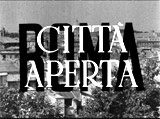
|
Rome, Open City (1945, It.)
(aka Roma: Citta Aperta)
In Roberto Rosselini's influential, landmark, low-budget,
post-war classic - he formally introduced Italian Neo-realism, and
it was the first film in a Rossellini 'war trilogy' (followed by
Paisan (1946) and Germany Year Zero (1948)) - it featured
on-location cinematography, grainy low-grade black-and-white film
stock (due to war-time), and untrained actors in improvised scenes
- it told of the Nazi occupation of Rome (and Italian resistance)
in 1944:
- in the opening scene, German soldiers marched through
occupied Rome, chanting: "Soar
high, Red Eagle! O'er swamp and sand, O'er dark pine forests, All
hail my Brandenburg homeland"
- the introduction of
some of the major characters: atheistic, underground Resistance
leader Giorgio Manfredi (Marcello Pagliero), an engineer,
was viewed evading Nazis who had come searching for him in his rooming
house; warned of the SS' imminent approach in a dragnet operation,
he fled across rooftops and escaped
- the German soldiers were being commanded by vicious
and cruel Gestapo Nazi Major Bergmann (Harry Feist), who in an
early scene met with the city's Police Commissioner (Carlo Sindici)
- as they spoke together about Bergmann's main objective to capture
Giorgio Manfredi, a professor was screaming nearby
(off-screen) during a torturous interrogation
- Giorgio sought refuge in the walk-up
apartment of a lithographer/printer friend - another underground
leader named Francesco (Francesco Grandjacquet), who worked for
a Communist newspaper; Francesco lived
next door to his pregnant
bride-to-be Pina (Anna Magnani), a widowed, former fuse factory
worker with a ten year-old mischievious son Marcello (Vito
Annichiarico) - who was involved with other boys in planting bombs
in the city; Pina and Francesco were to be married the next day by
the local parish priest instead of by "some Fascist in city hall"
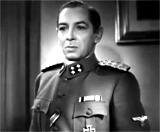
|
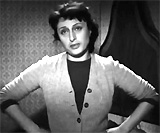
|
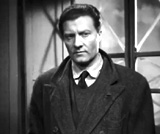
|
|
Effete SS Gestapo Nazi Major Bergmann (Harry Feist)
|
Pina
(Anna Magnani)
|
Giorgio Manfredi
(Marcello Pagliero)
|
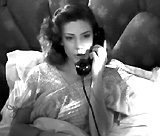
|
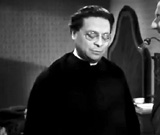
|
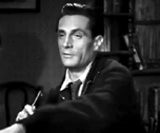
|
|
Marina (Maria Michi)
|
Parish Priest Don Pietro (Aldo Fabrizi)
|
Francesco (Francesco Grandjacquet)
|
- the film's main spiritual force was Catholic parish
priest Don Pietro Pellegrini (Aldo Fabrizi); he appeared first at a
boys' soccer game in the street; he was secretly involved
in the resistance movement, and had agreed to transfer messages
and money (1 million lire hidden in the pages of a book) from Giorgio
to a group of 500 Resistance fighting rebels outside the city
after the 5 pm curfew (recognized by a whistle signal); while in a
shop - a front for the rebels, Don
Pietro reacted to two statues: a small statue of St. Rocco
and another statue of a voluptuous nude; he faced them away from each
other to avoid temptation
- soon, a number of paths would cross, due to Giorgio's
disgruntled mistress Marina (Maria Michi), a cabaret/nightclub
worker, drug-user and part-time prostitute; in her dressing room,
Marina was being spied upon by Ingrid (Giovanna Galletti) - SS Commander
Bergmann's sinister assistant
- before her wedding in a semi-'confessional' scene,
Pina (while walking on her way home) expressed her doubts and shame
to the priest about how Francesco could be better off by marrying
someone other than a penniless widow with a child: ("I know he could
have found someone better"); she was distraught about her difficult
life of suffering, anxiety and fear: ("Doesn't Christ see us?") and
received reassurances from the priest: "So many people ask me that:
'Doesn't Christ see us?' But are we sure we haven't deserved this
scourge? Are we sure we've always lived according to the Lord's laws?
People never think of changing their ways, but when the piper must
be paid, they despair and ask, 'Doesn't the Lord see us? Doesn't
he take pity on us?' Yes, he does, but we have so much to be forgiven
for, and for that we must pray and forgive many things"; Pina
was more despairing: "You're right, but how do we forgive?"
- that night in
their apartment stairwell, an upset and tired Pina (who had just had
a fight with her sister Laura (Carla Rovere)) spoke to her fiancee;
the engaged couple discussed
their two year relationship and the precarious situation the war
had put them in: (Francesco: "Everyone foolishly thought it would
be over quickly, and that we'd only see it on newsreels" Pina: "When
is it going to end? Sometimes I just can't go on. This winter feels
like it will never end") - Francesco reassured her that they were fighting for a more beautiful
world: "It will end, Pina, and spring will come again, more
beautiful than ever, because we'll be free. We have to believe it
and want it. I can feel these things inside, but I can't explain
them.....We mustn't be afraid now or in the future because we're
on the just path. Understand, Pina? We're fighting for something
that has to be, that can't help coming. The road may be long and
hard, but we'll get there, and we'll see a better world. And our
children especially will see it - Marcello and the one on the way. That's
why you mustn't ever be afraid, whatever happens"
- in a
shocking, realistic scene early the next day - a raid was conducted
by the Gestapo and police on Francesco's apartment building (on
his planned wedding day); the building was evacuated and Pina's
fiancee was being dragged by Germans and Fascists to
a truck; during
the seizure, Pina broke away from a SS guard molesting her and
ran after the military truck carrying him away; she hysterically
screamed Francesco's name but was abruptly machine-gunned and
killed in front of her young son Marcello and heroic, brave Catholic
parish priest Don Pietro Pellegrini; the priest rushed to her body,
held her in his arms, and prayed for her soul
|
The Murder of a Pregnant Pina on Her Wedding Day
|
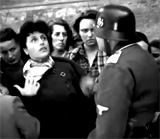
|
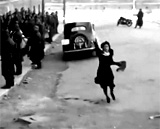
|
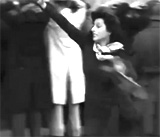
|

|
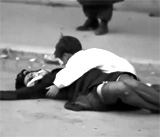
|
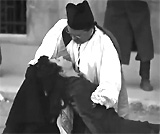
|
- meanwhile, during Francesco's transport, he escaped
when he and many others were rescued by other freedom fighters -
END of PART ONE
- PART TWO - Francesco reconnected
with Giorgio and the two were aided by his lover Marina who suggested
that they stay at her place for the night; that evening, Giorgio
and Marina argued and she admitted she used her body to acquire
things to avoid poverty and starvation: "I've gotten by like
every other woman...Life is filthy and brutal"; he denounced
her materialism: "Poor Marina. You think happiness means a fancy
apartment, nice clothes, a maid, and rich lovers"; shortly later,
the eavesdropping Marina sold out and betrayed him after she overheard
that Giorgio and the grieving Francesco were planning
to meet with the priest the next day with plans to hide in a monastery;
out of spite, Marina informed
Ingrid (and the Gestapo and Italian police) of his whereabouts, in
exchange for drugs and a fur coat given to her by Ingrid - although
she soon realized her mistake: ("What have I done?")
- the next morning after Giorgio and the priest were
seized by the Nazis (Francesco avoided arrest), Major Bergmann was
pleased and announced his plan for the captured rebels:
"These men must talk before the curfew is up. The rebels must not
learn of their arrest. We have ten hours"
- in an excruciatingly-long
sequence (16 minutes in length), Giorgio was subjected to extreme
torture and beating by the Nazis - as military justice for being a
leader of the National Liberation Committee; simultaneously, sympathizing
rebel priest Don Pietro (who had provided refuge and forged documents
to help the cause) was forced to endure high-pressure questioning
at the Nazi headquarters - but he refused to cooperate and claimed
innocence: "A man who humbly seeks to practice charity...God will
judge...I know nothing. What little I know I learned in the confessional,
and those secrets must die with me. It's our vow"; the priest listened
as Giorgio was accused of being a subversive Communist by Bergmann:
"He's a subversive and an atheist - your
enemy"; the priest replied calmly that he would refuse to comply with
the Major: "I am a Catholic priest. I believe that anyone fighting
for justice and liberty walks in the ways of the Lord. And the ways
of the Lord are infinite"
- during the torture session, in an adjoining bar/lounge
area, Major Bergmann spoke to drunken Nazi Captain Hartmann (Joop
van Hulzen) who affirmed that due to the rebels' righteous cause,
the brave and courageous Giorgio would never talk - therefore, his
refusal negated the widespread assumption that Germans were a master
race: "We
Germans refuse to realize that people want to be free....All we're
really good at is killing, killing, killing! We've strewn all of
Europe with corpses, and from their graves rises up an unquenchable
hatred. Hatred - hatred everywhere! That hatred will devour us. There's
no hope....We'll all die without the slightest hope"; Bergmann
left even more frustrated
|
Images From Giorgio's Torture Sequence
|
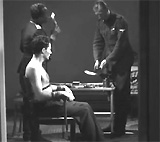
|
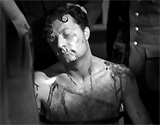
|
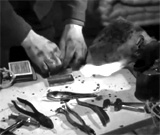
|
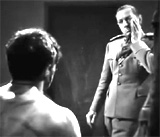
|
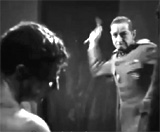
|
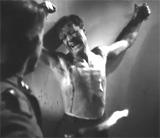
|
- on the verge of death and refusing to talk, Giorgio
defiantly spit blood into Major Bergmann's face; he was then subjected
to more beatings and burning by blowtorch (in a Christ-crucifixion
pose pressed against a blood-stained wall) and the ripping out
of his fingernails, as the priest was compelled to witness his gruesome
death; the priest cursed the Germans and blessed Giorgio's
soul: "It is finished. You tried to destroy his soul, but you only
destroyed his body! Curse you all! You'll be trampled in the dust
like worms. Curse you all!"
- Major Bergmann made efforts to avoid creating a martyr,
by falsifying the report on Giorgio's death (it was declared a heart
attack), and by using his alias name Giovanni Episcopo, saying: "Else
we create another martyr, and they already have plenty"; Marina, who
screamed and fainted at the sight of her dead ex-lover, had her fur
coat removed by Ingrid
- in the film's concluding sequence, the
uncooperative priest was taken to an open field for an early-morning
execution; he was to be positioned
in a chair in front of an Italian firing squad; the
only witnesses were a group of church altar boys (including Marcello)
contained behind a barbed-wire enclosure; Don Pietro
spoke to a fellow priest: ("Come, be brave. Oh, it's not hard
to die a good death. What's hard is to live a good life"); during
the first round of gunfire, the hesitant Italian soldiers all deliberately
missed their target; the priest
appealed to God to forgive his executioners for what they were
about to do ("God forgive them"); the angered German Gestapo
officer in charge personally decided to shoot Don Pietro in the head;
the group of altar boys with bowed heads sorrowfully walked arm-in-arm
back to the city, in view of St. Peter’s
Basilica
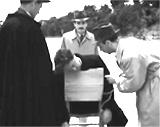
|
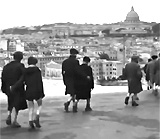
|
|
The Dead Priest
|
Altar Boys Walking Back Into the City
|
|

Giorgio Manfredi Fleeing onto Rooftop From German Soldiers
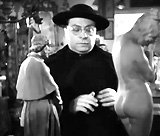
Priest Don Pietro with Two Contrasting Statues
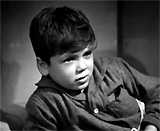
Marcello - Pina's Mischievous Son
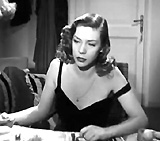
Marina (Maria Michi) in Dressing Room of Cabaret/Nightclub
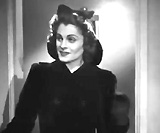
Bergmann's Sinister Spy-Assistant Ingrid
(Giovanna Galletti)
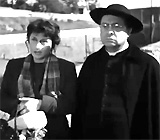
Pina with the Priest, Speaking About Her Difficult Life
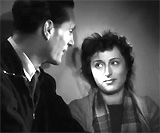
Pina's and Francesco's Stairwell Talk
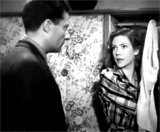
Giorgio's Argument with Marina About Her Materialism
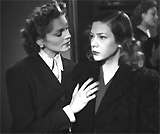
For Her Betrayal, Marina Received Fur Coat From Ingrid
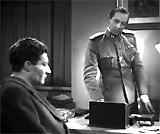
Giorgio's Face-Off With Major Bergmann
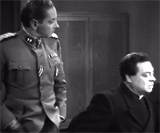
Priest Don Pietro's Questioning by Major Bergmann
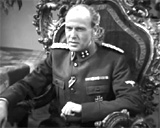
Nazi Captain Hartmann (Joop van Hulzen)
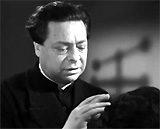
The Priest's Blessing Over Giorgio's Dead Body
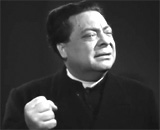
The Priest's Curse Upon the Germans
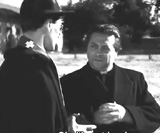
The Priest's Last Words to a Fellow Priest
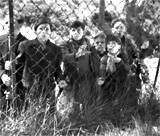
Altar Boys Witnessing Execution
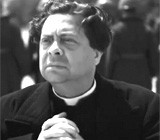
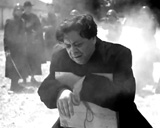
Deliberately Missed Shots

Shot in Head
|




















